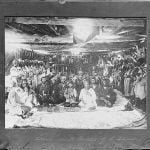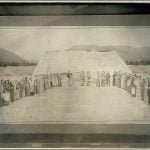
Smohalla, an Indian prophet and teacher, the originator of a religion which was prevalent among the tribes of the upper Columbia River and adjacent region in Washington, Oregon and Idaho, whence the name “Smohallah Indians” sometimes applied. The name, properly Shmoqŭla, signifies “The Preacher,” and was given to him after he became prominent as a religious reformer. He belonged to the Sokulk, a small tribe cognate to the Nez Percé and centering about Priest rapids on the Columbia in eastern Washington.
Smohalla was born between 1815 and 1820, and in his boyhood frequented a neighboring Catholic mission, from which he evidently derived some of his ceremonial ideas. 1 He distinguished himself as a warrior, and began to preach about the year 1850. Somewhat later, in consequence of a quarrel with a rival chief 2 , he left home secretly and absented himself for a long time, wandering as far south as Mexico and returning overland through Nevada to the Columbia. On being questioned he declared that he had been to the spirit world and had been sent back to deliver a message to the Indian race.

This message, like that of other aboriginal prophets 3 , was, briefly, that the Indians must return to their primitive mode of life, refuse the teachings or the things of the white man, and in all their actions be guided by the will of the Indian God as revealed in dreams to Smohalla and his priests.
The Smohalla doctrine found many adherents, Chief Joseph and his Nez Percé being among the most devoted believers. Smohalla died in 1895, but, in spite of occasional friction with agency officials, the “Dreamers,” as they were popularly called, maintained their religious organization, with periodical gatherings and an elaborate ceremony well into the 20th century.
For further information on Smohalla
- The Ghost Dance
- Ghost Dance Religion, 14th Rep. B. A. E., 1896.
Citations:
- Likely either the Whitman or Spalding Missions.[
]
- It is said that the rival chief with whom Smohalla quarrelled was Moses[
]
- Within the United States nearly every great tribal movement originated in the teaching of some messianic prophet. This is notably true of the Pontiac conspiracy in 1763-64, and of the combination organized by Tecumseh and his brother, the prophet Tenskwatawa, shortly before the War of 1812.[
]
